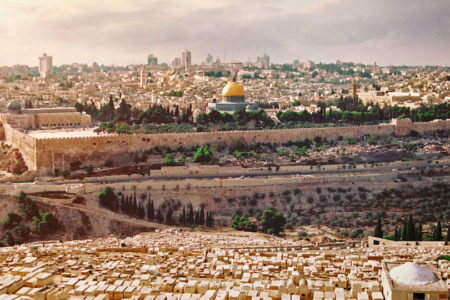Messengers With a Mandate Revelation 11
The long interlude between the sixth and seventh trumpets is continued from chapter 10. In the last verse of that chapter, John was instructed that he must prophesy again about many peoples, tongues, and nations. His prophecy was to describe major events that will take place during the last half of the Great Tribulation, as God thwarts the nations’ attempt to destroy His plan and purpose for Israel and the world. Three aspects of these events—the Tribulation Temple, the two witnesses, and the seventh trumpet—are revealed in this chapter.
Temple Measured
Sometime before the midpoint of the Tribulation, Israel will build a Temple in Jerusalem and restore the Levitical worship system. John was given “a reed like a rod” and instructed by the angel to “Rise, and measure the temple of God, and the altar, and them that worship in it” (v. 1). Many scholars believe that the Temple, altar, and worshipers are being measured for preservation and protection. It is probable that this is to show that they are God’s unique possession, in response to “the court” and “the holy city” (Jerusalem), which are “given unto the nations” to be trodden “under foot forty and two months” (v. 2) during the Tribulation.
Although Israel maintains control over Jerusalem today, such will not be the case during the Great Tribulation. That period will begin with the Antichrist making a covenant with Israel for seven years (the “one week” of Dan. 9:27). This seven-year period is divided into two equal parts of three and a half years each. Israel will live in peace, protected by the Antichrist, during the first three and a half years, but at the midpoint of the Tribulation he will take over Jerusalem and the Temple. He will tread both Jerusalem and the Temple under foot for 42 months, the last three and a half years of the Tribulation. This is substantiated by Jesus’ prophecy in Luke 21:24. “The times of the Gentiles” began during the reign of Nebuchadnezzar of Babylon and will not be fulfilled until the Second Coming of Christ (v. 15).
Two Messengers
Abruptly, John is introduced to God’s “two witnesses,” who “shall prophesy a thousand two hundred and threescore days, clothed in sackcloth” (v. 3). Who are these witnesses?
Some believe they represent the church because they are called “lampstands” (v. 4). Although lampstands represent the church earlier in Revelation (1:20), this position is unlikely here because the church is not mentioned or alluded to during the Tribulation. It is clear from the text that these witnesses are individuals for the following reasons: the definite article before “two witnesses” (v. 3); they are dressed in “sackcloth” (v. 3); they are killed (v. 7); their bodies lie in the street (v. 8); they are resurrected (v. 11); and they ascend into heaven (v. 12).
Others identify the two witnesses as Enoch and Elijah because they both were translated into heaven without dying. Those holding this position point out Hebrews 9:27, “it is appointed unto men once to die.” Thus, Enoch and Elijah would suffer death during the Tribulation. This interpretation is untenable. Christians who are alive on the earth when the Rapture of the church occurs will not suffer death (1 Th. 4:17), nor will the believers who survive the Great Tribulation (Mt. 25:33–34). Although Elijah exhibited the miraculous gifts manifested by these two witnesses (v. 6), Enoch did not.
Still others identify the two witnesses as Moses and Elijah for the following reasons. Moses represents the Law and Elijah the prophets. Both performed the miracles mentioned in verse 6. Both are called prophets. Both appeared with Jesus during His transfiguration. There is some mystery concerning the death of Moses (Dt. 34:5–6; Jude 9), and Elijah was translated without seeing death (2 Ki. 2:11). Scripture indicates that Elijah must come “before the coming of the great and terrible day of the Lord” (Mal. 4:5). Both had a message of judgment.
This teaching has several difficulties. It is evident that Moses did die (Dt. 34:5–6), and this position would require him to die a second time. It could be argued that this is not a problem because all of the people whom Jesus raised from the dead died a second time (i.e., Lazarus). Another objection is that John the Baptist fulfilled the prophecy concerning Elijah by coming “in the spirit and power of Elijah” (Lk. 1:17). Jesus said, “But I say unto you, That Elijah is come already…Then the disciples understood that he spoke unto them of John the Baptist” (Mt. 17:12–13). Jesus also said, “And if ye will receive it, this is Elijah [referring to John the Baptist], who was to come” (Mt. 11:14). If Israel had repented and received Jesus as the Messiah, John would have fulfilled this prophecy. But Israel did not repent, so the prophecy still must be fulfilled. John’s ministry was like Elijah’s, but he denied being Elijah (Jn. 1:21) and did not restore all things.
A number of teachers believe the two witnesses will not be figures from the past but will exhibit a ministry similar to Moses and Elijah’s. This position has merit because the text does not identify the two witnesses. If these witnesses are from the past, then Moses and Elijah seem to be the best candidates.
The witnesses are described as “two olive trees, and the two lampstands standing before…God” (v. 4). Their mission is similar to that of Joshua the high priest and Zerubbabel the civil leader (Zech. 4:2–3, 11–14), who were raised up as lights (lampstands), ready to implement their prophetic witness through power supplied by the Holy Spirit. The two witnesses will be endued with miraculous power enabling them “to shut heaven, that it rain not in the days of their prophecy; and have power over waters to turn them to blood, and to smite the earth with all plagues, as often as they will” (v. 6). They will be protected from death until their ministry is completed. If anyone tries to harm them, “fire proceedeth out of their mouth, and devoureth their enemies” (v. 5). The enemies of Moses and Elijah were also destroyed by fire.
“When they shall have finished their testimony, the beast that ascendeth out of the bottomless pit shall make war against them…and kill them” (v. 7). Some scholars believe that the “beast” is Satan, while others teach that it is the Antichrist. Satan is referred to in Revelation as the dragon, not as a beast. The beast coming out of the bottomless pit is the Antichrist, who is empowered by Satan to kill the two witnesses. Their dead bodies will be left lying “in the street of the great city [Jerusalem], which spiritually is called Sodom [symbol of immorality] and Egypt [symbol of oppression and slavery]” (v. 8). The authorities will not “permit their…bodies” to be buried for “three days and a half,” so that the “peoples and kindreds and tongues and nations” (v. 9) can see them lying in the street. This will be possible through modern technology. Leaving a body unburied was the greatest contempt and humiliation that could be shown in biblical times.
The unbelieving earth dwellers will “rejoice” over their deaths by “mak[ing] merry, and…send[ing] gifts one to another” (v. 10). Such a celebration over these godly prophets is fiendish and childish, indicating the people’s total depravity and hatred for Tribulation believers (Robert L. Thomas, Revelation 8–22, An Exegetical Commentary [Chicago: Moody Press, 1995], p. 96). The reason for their celebration is clear: No more will they be “tormented” (v. 10) by the godly prophets’ miracles of judgment (vv. 5–6) and their message of repentance. The world will hate God’s messengers and their message (Heb. 11:35–38), but although they may silence the messengers, they cannot silence the message.
“After three days and a half” (v. 11), while the earth dwellers are rejoicing, God will vindicate His messengers by raising them from the dead. The prophets’ resurrection will cause “great fear [panic]” (v. 11), terrorizing the unbelieving world. Immediately the prophets will hear “a great voice from heaven saying unto them, Come up here” (v. 12). Their enemies will witness the prophets’ ascension as they are caught “up to heaven in a cloud” (v. 12).
In “the same hour” in which the witnesses ascend into heaven, “a great earthquake” will destroy a “tenth part” of Jerusalem, resulting in the death of “seven thousand” people (v. 13). The remaining population of the city will become panic-stricken and give “glory to the God of heaven” (v. 13). Will the remnant giving glory to God actually come to faith in Christ, or simply acknowledge His awesome power because of the earthquake? The text provides no indication that they will become believers. If true repentance were to be the result, God’s judgment most likely would be postponed, or at least delayed. John records that this is not the case: “The second woe is past and, behold, the third woe cometh quickly” (v. 14).
Trumpet Mentioned
The blowing of the seventh trumpet introduces the third woe and contains the seven bowl judgments, which are not poured out upon the earth until later (16:1ff). Again, heaven is opened and John hears a multitude of voices declaring, “The kingdom of this world is become the kingdom of our Lord, and of his Christ, and he shall reign forever and ever” (v. 15). The phrase “is [lit., has] become” views Christ’s future rule over this world as already accomplished. Christ will reclaim rule over the kingdoms of this world at His Second Coming. This will settle the question of who is the sovereign ruler over planet Earth.
Upon hearing this, “the four and twenty elders…fell upon their faces, and worshiped God” (v. 16) by giving Him “thanks” (v. 17). They thank God for who He is: “O Lord God Almighty, who art, and wast, and art to come” (v. 17). They thank God for His worldwide rule: “because thou hast taken to thee thy great power, and hast reigned” (v. 17). They thank God for His wrath upon the ungodly: “And the nations were angry, and thy wrath is come [lit., came]” (v. 18). This is the fulfillment of God’s wrath that will be poured out upon the nations (Ps. 2:1–6, 8–9), who will set themselves against Christ at His Second Coming. He will destroy them with the word of His mouth when He treads “the winepress of the fierceness and wrath of Almighty God” (19:15). They thank God for judging the wicked: “that they should be judged” (v. 18). They thank God for rewarding the works of the righteous: “and that thou shouldest give reward unto thy servants, the prophets, and to the saints, and them that fear thy name, small and great” (v. 18). Some see the last two praises as a twofold time of judgment, where God will judge the wicked at the Great White Throne Judgment (20:10–15) and provide rewards to the righteous at the Bema Judgment (2 Cor. 5:10). It is better to interpret this verse as a general statement about God’s judgment on the wicked and the righteous. Finally, they thank God for judging worldwide wickedness: “destroy them who destroy the earth” (v. 18). God will destroy every kind of wickedness on the earth before setting up the Millennial Kingdom (19:17–21).
At the conclusion of this praise hymn, John reports, “the temple of God was opened in heaven, and there was seen in his temple the ark of his covenant” (v. 19). This is not the ark of the covenant translated to heaven before the destruction of Solomon’s Temple, but the original ark in God’s Temple. The Tabernacle fixtures were patterned after things in heaven (cp. Ex. 25:40; Heb. 9:23).
The descriptions of “lightnings, and voices, and thunderclaps, and an earthquake, and great hail” (v. 19) are a fitting conclusion to the sounding of the seventh trumpet, whose judgments will soon be poured out upon the earth (cp. 15:5–16:21).
Today, we sense that the world is moving swiftly toward a day of judgment. Like the two witnesses, we in the church are messengers with a mandate to proclaim the message of repentance and judgment to our generation while there is still time.







